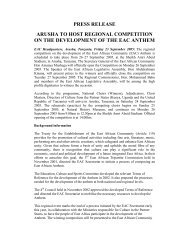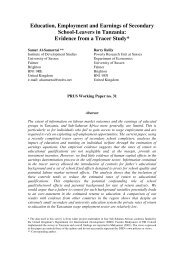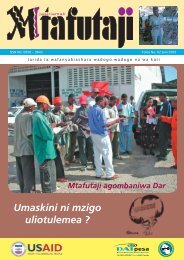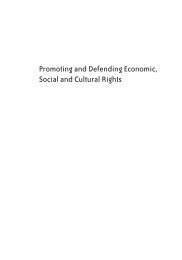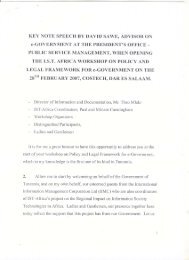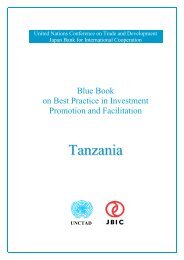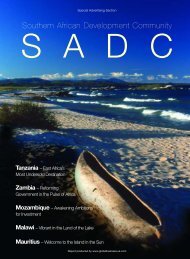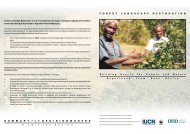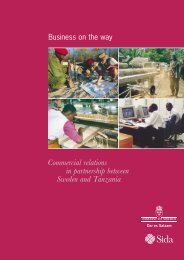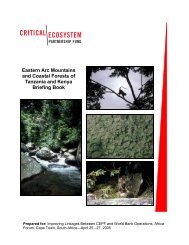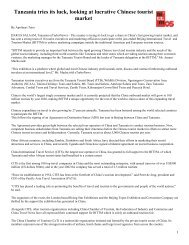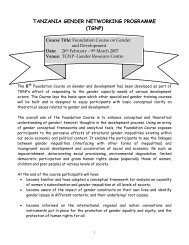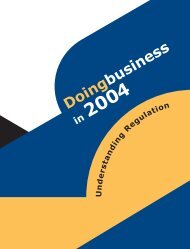Designing e-Government for the Poor - Tanzania Development ...
Designing e-Government for the Poor - Tanzania Development ...
Designing e-Government for the Poor - Tanzania Development ...
You also want an ePaper? Increase the reach of your titles
YUMPU automatically turns print PDFs into web optimized ePapers that Google loves.
Citizen-centric e-government: empowering <strong>the</strong> poor<br />
through innovative technology<br />
moment. Microsoft is working on local language programmes aimed at<br />
facilitating and enabling linguistic and cultural groups to benefit from ICT<br />
advancements. Currently, <strong>the</strong>re are 76 languages offered worldwide. At <strong>the</strong><br />
moment, India is receiving much investment from Microsoft including 150<br />
projects and <strong>the</strong> deployment of 7,000 kiosks. Such ICT projects are<br />
providing <strong>the</strong> following benefits:<br />
• Provide health services to previously inaccessible areas<br />
• Extend <strong>Government</strong> services and provide an open communication<br />
channel<br />
• Give farmers access to best market prices<br />
• Print astrological charts<br />
• Increase livelihood options<br />
• Empower women<br />
• Communicate with family members in o<strong>the</strong>r villages<br />
• Give artisans access to regional, national, and potentially global<br />
markets<br />
Based on Microsoft’s experiences and projects in India and o<strong>the</strong>r<br />
countries, specific factors have been found to contribute to <strong>the</strong><br />
sustainability of kiosks. These are: connectivity, access device, services,<br />
business model, and abilities of kiosk operator.<br />
In <strong>the</strong> discussion session that followed, Mr. Kushner was asked how<br />
to move to seamless interaction in <strong>the</strong> more advanced networked economy.<br />
Mr. Kushner replied that no country has yet moved to a completely<br />
seamless state because it is a long process of evolution. The participant<br />
from Cambodia mentioned that his government has been working with<br />
Microsoft in establishing a Khmer Unicode plat<strong>for</strong>m and developing applications<br />
<strong>for</strong> this plat<strong>for</strong>m. The problem is that <strong>the</strong>se applications can only be<br />
used with <strong>the</strong> most current and advanced hardware, but most people in<br />
Cambodia cannot af<strong>for</strong>d newer computer hardware. Mr. Kushner replied<br />
that dealing with older personal computers (PCs) was indeed a difficult<br />
issue because one has to balance between af<strong>for</strong>dability and developing<br />
more advanced technology. He added that this issue can be solved on a<br />
case by case basis, and that Microsoft is committed to provide af<strong>for</strong>dable<br />
hardware and localization. Ano<strong>the</strong>r participant asked Mr. Kushner which<br />
factors in addition to business process reengineering (BPR) are necessary<br />
<strong>for</strong> seamless e-government, and how Microsoft promotes <strong>the</strong>se factors. Mr.<br />
Kushner replied that open standards and technical standards are additional<br />
important driving factors towards seamless government. He said that in<br />
order to promote open standards, Microsoft is an active participant in<br />
organizations developing standards on intellectual property.<br />
25



